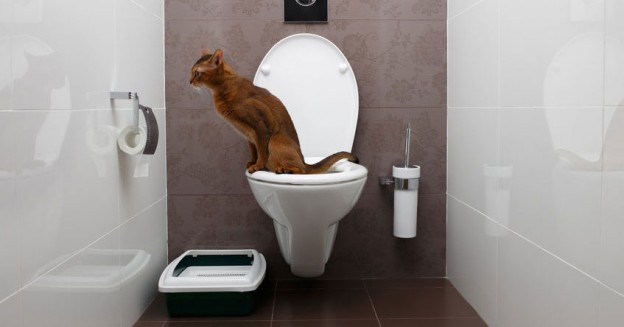Potential Risks of Flushing Cat Poop Down Your Toilet - Tips for Better Handling
Potential Risks of Flushing Cat Poop Down Your Toilet - Tips for Better Handling
Blog Article
This article following next about Don’t flush cat feces down the toilet is rather fascinating. Read on and draw your own personal assumptions.

Introduction
As pet cat owners, it's vital to be mindful of exactly how we deal with our feline good friends' waste. While it may seem practical to flush pet cat poop down the toilet, this practice can have detrimental consequences for both the environment and human health.
Ecological Impact
Flushing feline poop introduces damaging virus and bloodsuckers into the water supply, positioning a significant threat to marine ecological communities. These impurities can adversely affect aquatic life and concession water top quality.
Health Risks
Along with ecological issues, flushing feline waste can likewise position health and wellness threats to people. Pet cat feces might consist of Toxoplasma gondii, a bloodsucker that can cause toxoplasmosis-- a potentially severe health problem, particularly for expectant ladies and individuals with damaged immune systems.
Alternatives to Flushing
Luckily, there are safer and more accountable means to take care of cat poop. Think about the adhering to choices:
1. Scoop and Dispose in Trash
One of the most usual technique of taking care of cat poop is to scoop it into an eco-friendly bag and toss it in the garbage. Be sure to utilize a specialized trash inside story and get rid of the waste immediately.
2. Usage Biodegradable Litter
Opt for eco-friendly feline trash made from products such as corn or wheat. These trashes are eco-friendly and can be securely dealt with in the trash.
3. Hide in the Yard
If you have a lawn, take into consideration burying feline waste in a designated location away from vegetable yards and water resources. Make certain to dig deep sufficient to prevent contamination of groundwater.
4. Mount a Pet Waste Disposal System
Buy a pet dog garbage disposal system specifically designed for pet cat waste. These systems utilize enzymes to break down the waste, minimizing smell and environmental effect.
Verdict
Responsible animal possession prolongs past offering food and sanctuary-- it additionally involves appropriate waste management. By refraining from flushing feline poop down the bathroom and choosing different disposal techniques, we can minimize our ecological impact and shield human health.
Why You Should Never Flush Cat Poop Down the Toilet
A rose by any other name might smell as sweet, but not all poop is created equal. Toilets, and our sewage systems, are designed for human excrement, not animal waste. It might seem like it couldn’t hurt to toss cat feces into the loo, but it’s not a good idea to flush cat poop in the toilet.
First and foremost, assuming your cat uses a litter box, any waste is going to have litter on it. And even the smallest amount of litter can wreak havoc on plumbing.
Over time, small amounts build up, filling up your septic system. Most litter sold today is clumping; it is made from a type of clay that hardens when it gets wet. Ever tried to scrape old clumps from the bottom of a litter box? You know just how cement-hard it can get!
Now imagine just a small clump of that stuck in your pipes. A simple de-clogger like Drano isn’t going to cut it. And that means it’s going to cost you big time to fix it.
Parasitic Contamination
Believe it or not, your healthy kitty may be harboring a nasty parasite. Only cats excrete Toxoplasma in their feces. Yet it rarely causes serious health issues in the cats that are infected. Most people will be fine too if infected. Only pregnant women and people with compromised immune systems are at risk. (If you’ve ever heard how women who are expecting are excused from litter cleaning duty, Toxoplasma is why.)
But other animals may have a problem if infected with the parasite. And human water treatment systems aren’t designed to handle it. As a result, the systems don’t remove the parasite before discharging wastewater into local waterways. Fish, shellfish, and other marine life — otters in particular — are susceptible to toxoplasma. If exposed, most will end up with brain damage and many will die.
Depending on the species of fish, they may end up on someone’s fish hook and, ultimately on someone’s dinner plate. If that someone has a chronic illness, they’re at risk.
Skip the Toilet Training
We know there are folks out there who like to toilet train their cats. And we give them props, it takes a lot of work. But thanks to the toxoplasma, it’s not a good idea.

I am just very fascinated with Don’t flush cat feces down the toilet and I really hope you appreciated the page. Are you aware of somebody who is excited about the topic? Please feel free to promote it. Thank you so much for your time invested reading it.
Call Today Report this page